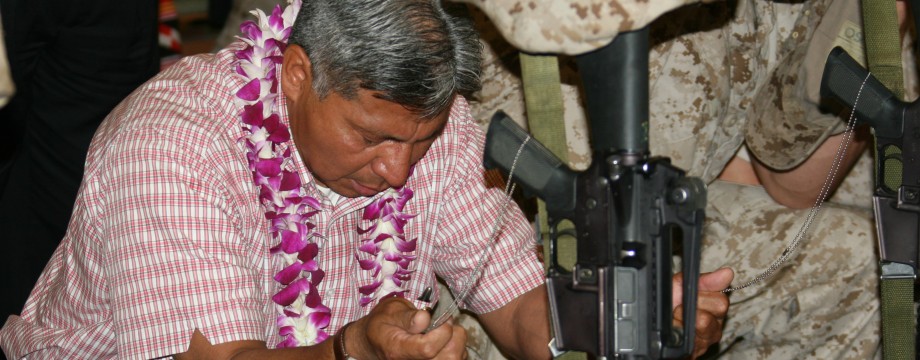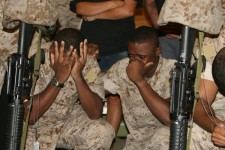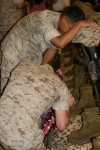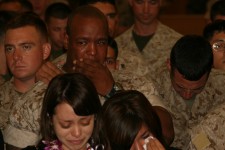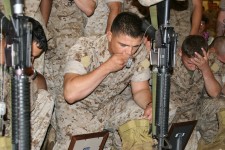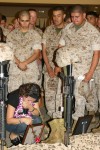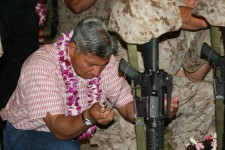 “The Battalion conducted a Memorial Service at the Base Chapel to remember and honor the fallen Marines from the deployment to Iraq in support of OIF.” — Source: 3/3 Command Chronology for the Period 01 October to 31 December 2006
“The Battalion conducted a Memorial Service at the Base Chapel to remember and honor the fallen Marines from the deployment to Iraq in support of OIF.” — Source: 3/3 Command Chronology for the Period 01 October to 31 December 2006
Contents
3/3 Command Chronology
“On the afternoon of 20 October, the Battalion gathered at the base Chapel to remember the fallen Marines from the deployment. Thanks to a generous donation made by the Navy and Marine Corps Relief Society, the families of the Marines were able to fly to Hawaii and join the Battalion for this Ceremony. Representatives from each of the fallen Marines’ platoons escorted the families throughout their stay. It was a moving service and helped bring closure to the families as well as to the Marines. At the service the following Marines were honored for giving their lives in service for their country: Corporal Andres Aguilar, Jr., H&S Company; Staff Sergeant Jason C. Ramseyer, H&S Company; Corporal Eric R. Lueken, H&S Company; Lance Corporal Hatak M. Yearby, H&S Company; Lance Corporal Jose S. Marindominguez, H&S Company; Sergeant David R. Christoff, Kilo Company; Lance Corporal William J. Leusink, Kilo Company; Lance Corporal Adam C. Conboy, Kilo Company; Lance Corporal Michael A. Estrella, India Company; LCpl Ryan A. Miller, Lima Company; and Cpl Yull Estradarodriquez, Lima Company.” — Source: 3/3 Command Chronology for the Period 01 October to 31 December 2006
News
48 Marines, one Sailor receive Purple Hearts
Battalion Memorial Services (19-20 Oct 06)3/3 awarded 49 Marines and Sailors the Purple Heart medal; the following day, the battalion held a formal memorial service for the Marines killed in Iraq.
Marine Corps Base Hawaii
October 19, 2006
MARINE CORPS BASE HAWAII — Approximately 48 Marines and one Sailor from 3rd Battalion, 3rd Marine Regiment received Purple Hearts during a short ceremony at the Marine Corps Base Hawaii, Kaneohe Bay, theater Oct. 19.
As Lt. Col. Norman L. Cooling, commanding officer, 3/3, stepped in front of each warrior, he carefully clipped the medal to their digital uniform. He then took a moment to talk to each one; his words just loud enough for the Marine in front of him to hear.
In the audience, family members of some of the Marines who didn’t return and fellow service members from the regiment watched the ceremony. Not a word could be heard throughout the crowd.
After each medal was given, read and the wounded warriors returned to their seats, a list of Marines who had already received their medal was read. Then Cooling began to speak; first to the families who were present.
“We honor the families of our Marines who didn’t return with us,” he said. “Nothing we receive here today compares to the sacrifice these families have made.”
Cooling continued to say to the families although they have lost their children, they have 960 Marines sitting behind them that will always be their sons.
With that, the speech then turned to the wounded Marines.
There are many different stories about how each one earned the medal, but according to Cooling each story is connected by valorous actions.
“Thank you for your contribution for the Marine Corps family and your country,” the commanding officer said to his wounded men.
Most of the Marines were modest about receiving the medal.
“It is hard to put into words,” said Cpl. Reginald Hodge, rifleman, India Company, 3/3, who was shot in his left arm while cornering off a house in Iraq. “It reminds me of the many Marines who were unable to make it back. It is a lesson that I will have with me for the rest of my life.
“It has humbled me.”
The Purple Heart medal was established during the Revolutionary War by Gen. George Washington Aug. 7, 1782 in Newburgh, N. Y.
A special guest was present during the ceremony. Sgt. Robert O’Malley, Medal of Honor recipient for his conspicuous gallantry and intrepidity in action against the communist {Viet Cong} forces at the risk of his life above and beyond the call of duty while serving as Squad Leader in Company I, 3/3, 3rd Marine Division {Reinforced} near An Cu’ong 2, South Vietnam, Aug. 18, 1965.
O’Malley and his wife presented a picture signed by Marines who received the Medal of Honor during World War II. It is the 33rd print in a series of more than 1,000.
“We want to thank you so much for what you do every day for our country,” said O’ Malley’s wife and creator of the picture.
O’Malley continued after his wife, “If it wasn’t for you guys, I don’t know what our country would turn into.”
He then looked to the sea of Marines and belted a loud, “Ooh-rah!”
The Marines echoed back in unison, “Ooh-rah” to the Medal of Honor winner.
As the Marines began to clap and the ceremony was about to end, he said one last thing to his younger brothers, “Semper Fi,” which means always faithful. A fitting end to a touching ceremony.
Source: Marine Corps Base Hawaii
Marine Purple Hearts: a time to recall, forget
By William Cole || October 20, 2006
KANE’OHE BAY — The Hawai’i Marines, most of them in their 20s, talked in clipped sentences about the violence that earned them Purple Hearts in Iraq.
Their descriptions of roadside bombs, attacks and the intensity of not knowing what was coming next spoke to the hostility in the Sunni heartland of Anbar Province.
A roadside bomb destroyed the Humvee Lance Cpl. Chaim Kozak was riding on April 22 in Baghdadi, northwest of the capital.
The 20-year-old from Michigan remembers “everything, but I’m kinda trying to forget, you know what I mean?” he said yesterday.
The hand, knee, spleen and other internal organ damage he suffered makes that difficult. He walks with a metal cane.
He and fellow Marines were “busy all the time. Hardly any sleep. Just trying to take care of killing some terrorists.”
Sgt. Christopher Kelbaugh, 22, was sleeping when a suicide truck bomber on July 24 barreled into a fortified building he and 16 Marines were in.
“I remember shots and running,” the Maryland man said.
A falling concrete block broke his nose. A monocle-like scar now circles his left eye.
Sgt. Jon Gonzalez, 27, from Arizona, was ambushed by several armed men in a palm grove in Baghdadi on Sept. 1. A machine-gun round shattered the bone in his upper arm.
They were among the 48 Marines and a sailor with the 3rd Battalion, 3rd Marine Regiment who received Purple Hearts yesterday with more than 900 fellow battalion members watching.
The last group of 3rd Battalion Marines, known as “America’s Battalion,” returned on Oct. 5. The Hawai’i battalion’s headquarters was at Haditha Dam, northwest of Baghdad, but Marines were spread throughout the “Triad” of Haditha, Haqlaniyah and Barwana near the Euphrates River and down to the Baghdadi-Jubbah-Dulab region.
Sunni attacks on U.S. forces have increased with the continuing occupation and frustration with a Shiite-dominated government. Eleven Marines with the 3rd Battalion and three attached to the unit from elsewhere were killed in Iraq since March.
Maj. Patrick Beckett, the executive officer for the 3rd Battalion, said it was an “exceptionally hostile” environment.
“There were very few uneventful days in the battalion with IEDs (improvised explosive devices), mortars, small-arms fire and ambushes, and that raises the intensity level,” Beckett said.
A total of 88 were wounded, with the most serious injuries including a leg amputation as a result of a roadside bomb and a gunshot wound to the chest resulting in partial paralysis.
The emotional trauma left some Marines deeply shaken, and a few buried their heads in their hands yesterday and wept during the Purple Heart presentation, which was made more personal with families of the dead Marines on hand. A memorial is planned at 3 p.m. today on the base.
Fourteen members of Cpl. Andres Aguilar Jr.‘s family from Texas filled an entire row yesterday in the base theater. All wore black T-shirts with the Marine Corps logo on the front and Aguilar’s name on the back.
The 21-year-old Marine was killed April 2 along with five other Marines when the 7-ton truck they were riding in rolled over during a flash flood near Al Asad.
“It’s taken us days, weeks, months, but we’re holding on,” said Aguilar’s uncle, Arturo Hinojosa. From the moment the family was told the news, “we were supportive of the troops, because this (being a Marine) is what he wanted to do.”
The fight, and losses, continue on for Hawai’i Marines in the Haditha area of Iraq. The 2nd Battalion, which replaced the 3rd Battalion, already has suffered five combat fatalities since Sept. 26.
The latest was 2nd Lt. Joshua L. Booth, 23, of Massachusetts, who was felled by a sniper’s bullet in Haditha on Tuesday.
Brig. Gen. Mastin Robeson, the 3rd Marine Division commander out of Okinawa, told the 3rd Battalion Marines yesterday they accomplished the toughest mission that a Marine has — making the “spur-of-the-moment decision” about when to use lethal force.
“You killed when you needed to kill. You saved when you needed to save,” he said.
Beckett said one of the 3rd Battalion’s legacies in Iraq is a more capable Iraqi security force. The primary mission now for U.S. forces is to train up Iraqi counterparts.
An Iraqi army battalion that wasn’t doing independent squad operations is now doing company-sized operations, he said. The force is primarily Shiite in a Sunni region, and “there were (acceptance) challenges with the local population; however, they were very professional,” Beckett said.
There were also attrition problems with Iraqi soldiers going AWOL, but the core group that remained was very proficient, he said.
Kelbaugh, the Marine injured in the suicide vehicle attack, said for him, a previous deployment to Afghanistan was “very quiet.” He’s getting out of the Corps in two weeks and going to college to be a wildlife biologist.
“Iraq’s definitely a very different place and a lot more violent towards Americans,” he said.
Copyright © Honolulu Advertiser 2006
‘There’s nothing like losing a child. Nothing’
By William Cole || October 21, 2006
KANE’OHE BAY — Hatak Yuka Keyu M. Yearby, a Choctaw, Creek and Seminole Native American, cut his hair when he joined another warrior culture, that of the U.S. Marine Corps.
His father, Justin, cut his hair, too, four days after his son was killed in Iraq on May 14 by a roadside bomb. Lance Cpl. Jose S. MarinDominguez Jr. also died in the blast.
The elder Yearby yesterday knelt at a combat memorial with upturned rifle, helmet and boots, and clutched the dog tags of both Marines as he grieved and sang to himself his son’s warrior song.
A final roll call and memorial was held yesterday for 11 Hawai’i Marines with the 3rd Battalion, 3rd Marine Regiment killed in Iraq on a recent deployment, and for their families, it was a chance to meet fellow Marines and bring spiritual closure to their loss.
“I had to know who these young men were. I had to know who his brothers were,” Justin Yearby said.
Eighty-one family members of the fallen Marines made the trip to Hawai’i and Kane’ohe Bay for yesterday’s memorial. They had come from Oklahoma, Puerto Rico, California, Texas, South Carolina and New York.
Eight members of Hatak Yearby’s family were there from Oklahoma. There were 14 members of the family of 21-year-old Cpl. Andres Aguilar Jr., killed on April 2 when the 7-ton truck he was riding in rolled over in a flash flood.
The Navy-Marine Corps Relief Society paid for the families to come out, and for all, it was important to be there.
“I buried my son’s body, I did not bury his soul. I feel that my son is with me, and that he is giving us the strength to continue life,” said Wanda Rodriguez.
Her son, Cpl. Yull Estrada Rodriguez of Alegre Lajas, Puerto Rico, was killed Sept. 20. He was a gunner on a 7-ton truck when it was struck by a roadside bomb just weeks before the battalion returned home.
The base chapel at Kane’ohe Bay was jammed with thousands of Marines. Most were from the 3rd Battalion, the last of which returned from western Iraq on Oct. 5 after a seven-month deployment.
“I had heard the voices of many of (the Marines) by phone, but personally, I didn’t know who they were,” Wanda Rodriguez said. It was a “wonderful” experience meeting them, she said. Her son was important in Puerto Rico, and meeting the Marines and seeing the turnout showed “he was something very important here, too.”
The emotion of the battalion’s 11 losses came flooding back at the close of the ceremony. Marines mingled with and hugged family members, knelt at the memorials with a framed photo of each Marine, and touched the helmet or said a prayer.
There were tears and recollections. Some family members stared blankly at the photos of fallen Marines, their faces ashen.
“There have always been others who say, ‘Oh, I know how you feel, I lost my dad,’ or, ‘I just lost my mother,’ ” Justin Yearby said. “Well, I’ve lost a dad, I’ve lost a mother, I’ve lost a grandparent, and there’s nothing like losing a child. Nothing.”
The 11 families and others who have lost children to war “are the only ones who know how we feel,” he said.
The Hawai’i battalion’s headquarters was at Haditha Dam, northwest of Baghdad, but Marines were spread throughout the “Triad” of Haditha, Haqlaniyah and Barwana near the Euphrates River and down to the Baghdad-Jubbah-Dulab region.
Sunni attacks on U.S. forces have increased with the continuing occupation and frustration with a Shiite-dominated government.
Eight of the 11 Marines were killed by roadside bombs. One died as a result of small-arms fire. Aguilar died in the vehicle rollover, and one Marine was killed in a friendly fire accident, family said. Three other Marines who were killed were attached to the 3rd Battalion from other units.
Lance Cpl. Dino Vigliotti, 19, was thrown 150 feet from a Humvee in the roadside bomb explosion that killed Yearby and MarinDominguez, and suffered a broken pelvis and collapsed lung, among other injuries.
Vigliotti’s mother, Sherry, traveled from Florida to be at Kane’ohe Bay yesterday.
“I wanted him to have a family member here for the (memorial),” she said. “He’s having a very difficult time.”
Staff Sgt. Jeremy Messerschmidt, 28, from Kentucky, remembered Sgt. David Christoff in particular. Christoff was killed on May 22.
“He was an amazing man,” Messerschmidt said. “Everyone looked up to him.”
Cpl. Jory Camille knew Cpl. Michael A. Estrella, 20, of Hemet, Calif., from a deployment to Afghanistan. Estrella was killed by small-arms fire on June 14.
“He was company (radio operator). He taught me how to use the radio and helped me a lot,” Camille said. “When I got back (from Iraq), I saw his number on my cell phone. It’s just like you are never going to see him again. It snaps you into reality.”
Copyright © Honolulu Advertiser 2006
48 Marines and a sailor receive the Purple Heart for service in Iraq
LANCE CPL. Dino Don Vigliotti was manning a 50-caliber gun on top of a Humvee when an improvised explosive device hit his vehicle, throwing him 150 feet. Two Marines in the vehicle were killed immediately.
The driver took most of the blast, saving Vigliotti and another Marine.
“It would have been me and my corporal,” said Vigliotti, who spent 12 weeks in the hospital.
Vigliotti and several other Marines of the 3rd Battalion 3rd Marine Regiment who were injured in Iraq commended their fellow Marines for saving their lives yesterday at a Purple Heart ceremony. The Marines finished returning this month from a seven-month deployment to the Haditha area in Iraq.
In front of nearly 1,000 Marines filling the Base Theater at the Kaneohe Marine Corps Base Hawaii, 48 Marines and one sailor with the Hawaii unit were honored with the Purple Heart medal.
Lt. Col. Norm Cooling noted that the ceremony was informal and would not take away from the memorial service tomorrow for the 12 Marines in the unit who died in Iraq.
“Nothing that we recognize here today compares to the sacrifice made by the families of the Marines that did not come back with us,” Cooling said.
“Although you have lost a son, there are 960 more behind you,” he told the family members of Marines who were killed in Iraq.
Marines lined up, offering their condolences to the mother of Cpl. Michael Estrella, who was killed in Iraq. After speaking with Estrella’s mother, Lance Cpl. Cogen Nelson said, “I just wanted to let her know that her son was a great person, a great friend. He was also a great Marine.”
The honored Marines and sailor marched onto the stage in companies. Cooling pinned the purple ribbon medal onto the left breast pocket of each Marine. Three Marines earned two purple hearts, Cooling said. Seventy-four Marines of the battalion were wounded in Iraq.
Sgt. Jon Gonzalez wore a black brace on his left arm. Three weeks before he was scheduled to return home, he was hit with a rifle bullet that broke his arm and severed his artery. Doctors told him he should regain 90 to 95 percent use of his arm.
For Gonzalez the Purple Heart was not of great importance. “I haven’t really thought about it,” he said. “I’m glad I’m back and all my guys came back alive.”
In August nearly 1,000 Marines with the 2nd Battalion 3rd Marine Regiment began deploying into Iraq to replace the 3/3.
Some Marines were anxious about the memorial service today for fellow Marines who were killed in Iraq.
“Tomorrow’s going to hurt,” Lance Cpl. Matthew Melendez said. “It’s going to bring back the feeling that I first had. It’s all balled up right now. I can feel it’s right there, ready to pop.”
Copyright © Honolulu Star-Bulletin 2006
3rd Battalion, 3rd Marine Regiment remember their fallen brothers
By Cpl. Sara A. Carter
Marine Corps Base Hawaii
October 20, 2006
MARINE CORPS BASE HAWAII — Outside, the cold rain poured heavily to the ground. People rushed from their vehicles to the covered area in front of the Base Chapel to avoid getting wet.
Inside, families with heavy hearts sat together in preparation for the memorial service for 11 fallen warriors from 3rd Battalion, 3rd Marine Regiment to begin. Many held tissues. They held each other’s hands, while others hug and do the best they can to comfort to each other.
Eighty-one family members of the fallen Marines made the trip to Marine Corps Base Hawaii, Kaneohe Bay, for the memorial Oct. 20. They traveled from as far away as Puerto Rico, New York, Texas, Oklahoma, South Carolina and California.
As the minutes ticked down to the beginning of the service, service members from the unit went up to the families, hugged them and gave words of encouragement to help ease the pain.
Major Patrick Beckett, executive officer, 3/3, stood in front of the crowd and ordered the battalion sergeant major to read the final roll call.
As the names were read, one-by-one, three Marines marched up to a picture of the fallen. One Marine was carrying a rifle, one a helmet and the other boots and dog tags. The center Marine stepped forward, turned the rifle with its barrel facing in a downward position and placed it in the stand. Then the Marine to his right gently placed the helmet on the butt stock of the rifle. Next, the Marine on the left placed a set of boots in front of the rifle and hung a pair of dog tags from the pistol grip.
As the 11 names were read, quiet sobs and sniffles echoed throughout the church and another group of Marines repeated the same process: Rifle, helmet, boots and dog tag.
“The greatest sacrifice is one that has left a battle scar on everyone in this command,” Lt. Col. Norman Cooling, commanding officer, 3rd Battalion, 3rd Marine Regiment. “It was the sacrifice made by your loved ones.
Cooling continued to talk about the ultimate sacrifice the Marines and their families have made.
“The most important part of today was to get the opportunity to meet you,” Cooling said as he looked up at the families. “This was an opportunity for the Marines of the man’s squad to share time and break bread with his family.”
Cooling paused for a moment, then said, “In the way you died, you taught us a better way to live,” he said of his fallen Marines.
At the conclusion of Cooling’s speech, taps was played. The Marines, who seemed to show little emotion during the beginning of the ceremony began to show signs of mourning. Many put their heads down or cupped their faces in their hands.
The families hugged each other tightly. Many tried to wipe away the constant flow of tears that stained their cheeks.
The families and Marines from the battalion then paid their final respects to their fallen brothers as they passed in front of their pictures. Many placed their hand on top of a helmet and bowed their head, tears streaming down their faces. Others knelt down and grabbed dog tags, holding them tightly in their hands.
The Marines hugged each other and tried to comfort each other. They cried on each other’s shoulders as if it was the first time they were able to really mourn the loss of their brothers.
Many of the mothers of the fallen looked at their son’s picture. They gently ran their fingers over the helmet, dog tags and boots that represented the one their son used to wear and the rifle he used to use. They continued to wipe their endless tears away.
The Marines hugged the family members. Each understood the other’s pain. Although none of the Marines were related by blood to any of the fallen, they were truly brothers. They lived in the same barracks, they worked at the same places and they served in the same conflict. They had a bond only they can understand.
But at that moment, everyone understood each other. Both families and service members lost someone they loved, someone who was important in their life.
“We did not leave you behind – you have temporarily left us behind,” Cooling said of his fallen Marines, “to clear the way before us – a battalion advance party to our heavenly father.”
Source: Marine Corps Base Hawaii
Photographs
- Justin Yearby holding Lance Corporal Hatak Yuka Keyu Yearby’s dog tags at at the battalion’s official memorial service, October 2006.
Video
Source: AFN Hawii News Bureau
